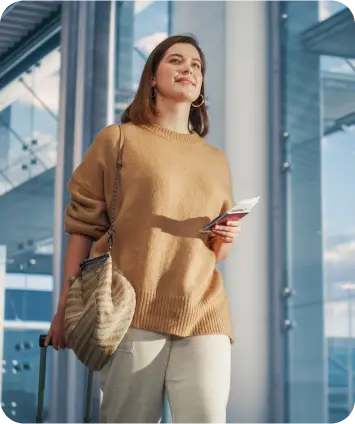Vietnam eVisa
From $103.99


Apply online with iVisa and skip the hassle. It's fast and secure. Whether you’re visiting for tourism, business, or transit, our simplified Vietnam eVisa application process and expert support make it easier from start to finish.
How to apply for your Vietnam visa with iVisa
Answer a few simple questions, upload your documents, see when you’ll get your visa, and pay using secure methods. You can save your progress and come back anytime. Most people finish in under 30 minutes.
The Vietnam eVisa is our most popular travel document for this destination. We’ll guide you through any unclear questions during the application process.
The Vietnam visa system is known for being a bit picky – your photo must be the right size, and your passport scan must be clear.
Don’t worry – we review your whole application to catch anything that might cause delays. One of our experts checks everything for errors or missing information to make sure it’s ready to go. This review is quick but thorough.
We’re not the government, but we submit your application to them and are here for you along the way if there are any problems.
We’ll email your approved visa and let you know how to use it for your trip.

The Vietnam eVisa is a convenient option for travelers visiting for tourism, business, or short-term purposes. It allows eligible travelers to enter Vietnam for up to 90 days, with both single and multiple-entry options available.
The entire process is online, so visiting an embassy is unnecessary. It’s one of the easiest ways to get authorized entry into Vietnam.
Work Visa (LD):
This visa is for foreigners working in Vietnam. Applicants need a valid work permit issued by the Vietnamese Ministry of Labor. The visa is usually valid for up to 2 years.
Investor Visa (DT):
Foreign investors planning to set up or invest in businesses in Vietnam may apply for this visa. The visa is divided into categories (DT1 to DT4) based on investment size.
Dependent/Family Visa (TT):
This visa is for family members of foreign nationals living in Vietnam, such as spouses or children. It allows a temporary stay and is typically linked to the sponsor's visa.
Working Holiday Visa:
Vietnam has working holiday agreements with a few countries, allowing young travelers to live, travel, and work temporarily. Valid for up to 1 year.
Diplomatic/Official Visas (NG, LV, PV):
These visas are for diplomats, government officials, NGO representatives, and other official delegations. Validity and requirements depend on the nature of the visit.
Meeting/Conference Visa (HN):
This visa is for individuals attending official events, seminars, or conferences in Vietnam. It’s usually short-term and tied to the event organizer.
Journalist Visa (PV1, PV2):
This visa is for foreign journalists or media professionals reporting from Vietnam. PV1 is for long-term assignments; PV2 is for short-term coverage.
Special Visas (NN, SQ, VR):
These cover a variety of niche travel purposes such as NGO work, market research, or special exemptions. Requirements vary based on the visa type.
Unfortunately, we don’t currently offer this visa*
Vietnam’s visa policy depends on your nationality, the purpose of your visit, and how long you plan to stay. Travelers from around 30 countries can enter Vietnam without a visa for up to 15, 21, or 45 days, depending on their country of origin.
Most other travelers must apply for a visa. One of the most popular options is the Vietnam eVisa, which is valid for up to 90 days and is available as a single or multiple-entry visa. It can be used for tourism, business, and other short-term purposes. The application is entirely online and available to citizens of over 80 countries.
Travelers must apply for a traditional visa through a Vietnamese embassy or consulate for more extended stays or specific purposes such as work, study, investment, or family reunification. These include visa categories like work visas, student visas, investor visas, and family or dependent visas.
All visitors must hold a passport valid for at least six months beyond the date of arrival and may be required to show proof of onward travel, accommodation, or financial means. Some visa types also require registration with local authorities once in the country.
Vietnam also offers visas for diplomats, officials, journalists, and travelers attending meetings or conferences. Sometimes, travelers may be granted humanitarian or special-purpose entry atthe government's discretion.
For the most accurate information, travelers should check with a Vietnamese embassy or official immigration source before applying.
Applying for a visa on your own can be confusing and time-consuming. iVisa simplifies the process, reduces errors, and gives you peace of mind
This depends on the visa type. The Vietnam eVisa is valid for up to 90 days and can be issued for single or multiple entry. Other visa types, like business or work visas, may be valid for up to 12 or 24 months, depending on your situation.
Processing times vary. If you're applying for the eVisa, we’ll review your documents and submit them for processing as fast as the speed you select at checkout. Embassy visas may take longer, especially if additional documents or interviews are required.
Some travelers can enter Vietnam without a visa for a limited time, usually between 15 and 45 days, depending on their nationality. You must apply for a visa in advance if you're not eligible.
With the Vietnam eVisa, you can stay up to 90 days. The number of entries you’re allowed depends on the option you choose during your application. Other visa types may offer longer stays but require additional documentation and approval.
You can apply directly with us if you’re eligible for the Vietnam eVisa. We’ll walk you through the process and ensure everything is submitted correctly.
No. Employment is not allowed on a tourist visa or eVisa. If you plan to work, you’ll need a work visa and a valid work permit issued by the Vietnamese government.
Most eVisas cannot be extended. If you’re already in Vietnam and want to stay longer, you may need to leave and apply for a new visa. Some long-term visa categories may be extendable through local immigration offices.
Overstaying can lead to fines, travel delays, or restrictions on future visits. Knowing your visa expiration date and planning your departure is important.
If you're staying in the airport's international transit area and continuing your journey within 24 hours, you typically won’t need a visa. If you plan to leave the airport or your connection requires changing terminals, you may need a valid visa depending on your nationality.
Once you apply with us, our experts will review your information and documents to reduce the chance of errors or rejections. After that, we’ll submit your application and send you the approved visa once it’s ready.
